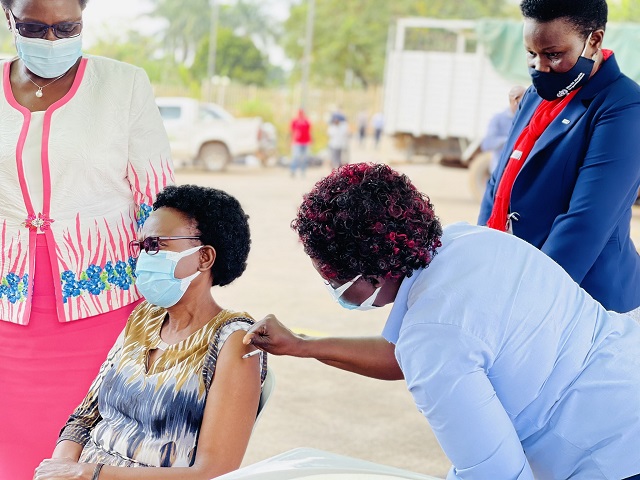Administration of the second dose of the AstraZeneca COVID-19 vaccine to persons who were inoculated during the first round that started in March started on Friday with Persons who are eligible called upon to receive it.
All persons going to get the second dose will have to present the Ministry of Health vaccination card that shows when they received the first dose. A number of legislators, health workers and journalists were among the first categories of people to benefit as the exercise kicked off this morning at the ministry headquarters in Kampala.
The second dose of the vaccine will boost the efficacy of the first dose and with it, persons will have 100 percent protection against hospitalization and severe forms of the disease. Health Minister Dr Jane Ruth Aceng says that inoculation will be carried out concurrently to ensure that persons who have not received the first jab are not disadvantaged.
The move comes barely a week after the ministry announced that vaccinated Ugandans would receive their second dose after 12 weeks. But Aceng says that the decision to start issuing the second jab was based on new evidence from the Scientific COVID-19 Advisory Committee and the Vaccine Advisory Committee, indicating that the vaccine is more effective if the second dose is issued between 8-12 weeks.
This is also emphasized by Prof Livingstone Sserwadda, the chairperson of the Vaccine Advisory Committee.
So far, Uganda has only received 964,000 doses of the vaccine of which 100,000 doses were a donation from the government of India and of these, only 488,986 people have been vaccinated against COVID-19.
However, the next consignment of AstraZeneca COVID-19 vaccines is not expected in the country until next month according to the Ministry of Health. The consignment from the COVID-19 Vaccine Global Access (COVAX) facility was initially expected in May.
But the Serum Institute of India, the source for Uganda’s COVID-19 jab announced that it was halting vaccine exports to first serve their domestic market in India where infections were soaring. The institute, one of the world’s largest manufacturers of coronavirus vaccines said its production capacity was very stressed, yet the shortage of raw materials was also affecting their production capacity at a time when India was so desperate for all the doses it can get to inoculate its population.
The Serum Institute has an agreement to supply 166 million doses to the Indian government, with another firm, Bharat Biotech supplying 10 million doses. India also has licensing deals with the Russian Gamaleya Research Institute to produce 200 million doses of the Sputnik vaccine.
Do you want to share a story, comment or opinion regarding this story or others, Email us at newsdayuganda@gmail.com Tel/WhatsApp........0726054858






Discussion about this post